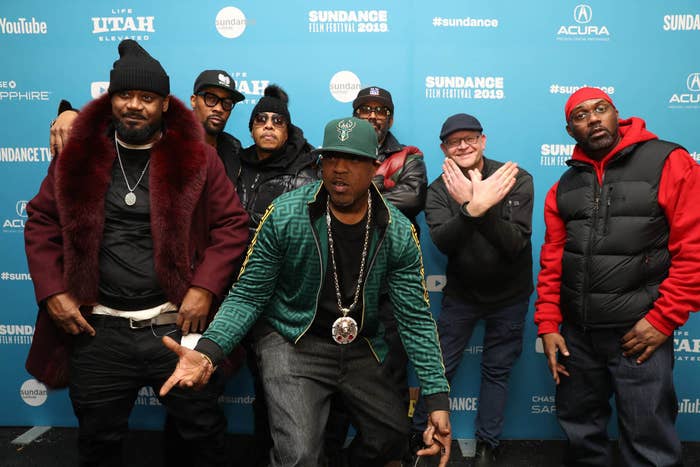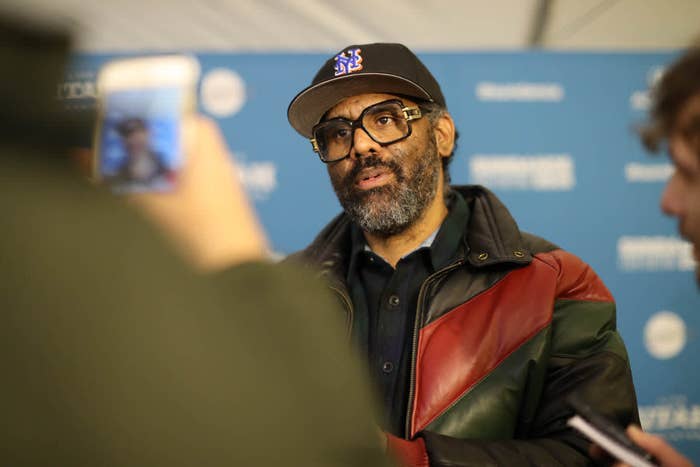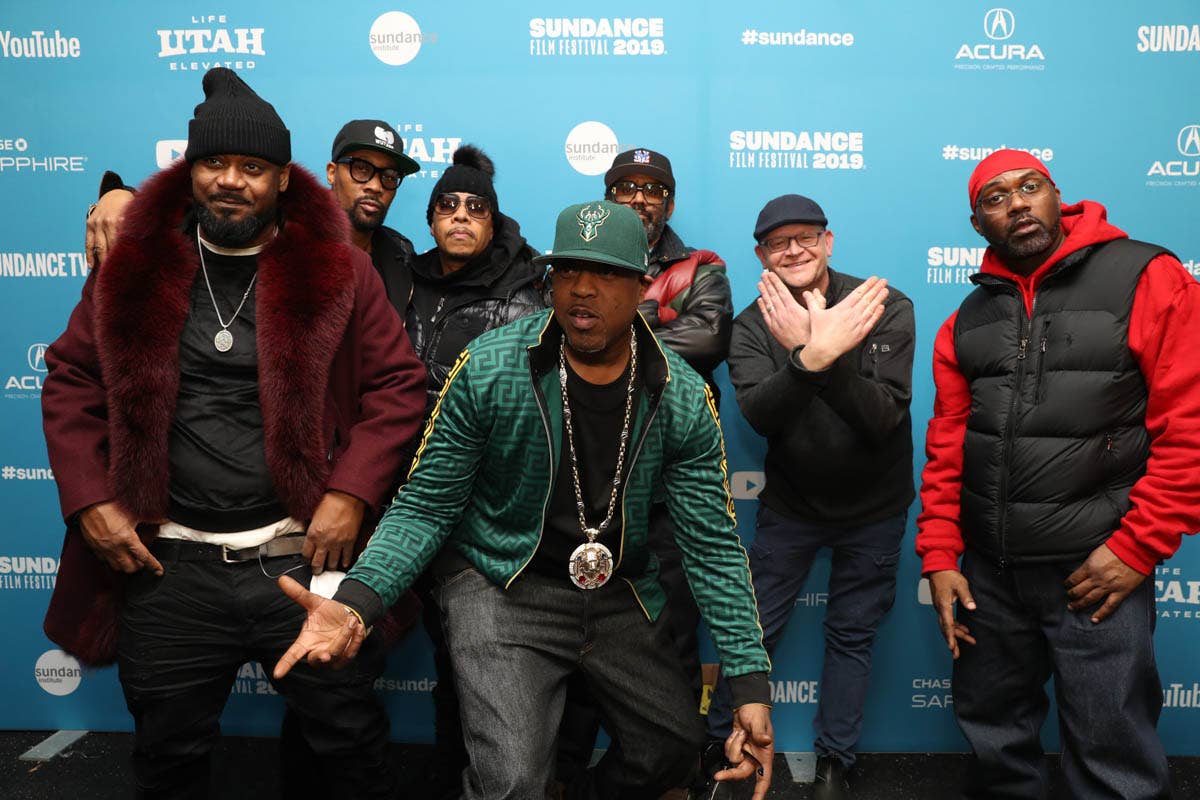
It’s the week of the Sundance Film Festival, and Sacha Jenkins walks into the Entertainment Studios Lounge in Park City, Utah, wearing a Goose Country leather V-Bomber. It’s the same coat made famous by the late New York drug dealer/folk hero Larry Davis. Tucked under his leather-cloaked arm is a record. It’s the first album from The 1865, an all-black rock n’ roll band singing and playing from a viewpoint of post-Civil War emancipated slaves. The album is called Don’t Tread on We. Jenkins is the lead guitarist in the band. Everything Jenkins does has a purpose, a symbol, or a worthwhile means to an end in the name of black culture and American history. Which is exactly why he was tapped as the director of Wu-Tang Clan: Of Mics and Men, the new four-part episodic documentary that unfurls the (extremely personal, never-before-seen) history of a group of New York natives that redefined a genre and changed the economics of the music industry. Jenkins gets it. To him, Wu-Tang isn’t just about showing an audience the group’s untold story—it’s about understanding history.
“History is our frenemy,” Jenkins says, sitting in the sun on a deck overlooking Main Street. “People struggle with what's in front of them. But if you just look behind you and you look at the shit that happened and how it was resolved, it might give you some tools to help you deal with what's in front of you. It’s easy to think, ‘this president sucks. I'm stuck. He's racist.’ But if you look back, you'll see the same things and you will see people just like you who had to deal with it and found a way to deal with it—and you can do that, too.”
Finding a way to “deal with it” is exactly what the 10 founding members of the Wu-Tang Clan did 25 years ago, when “Protect Ya Neck” hit airwaves and Enter the Wu-Tang dropped. For the first time, a mainstream audience heard what it was like to be poor, to live under the thumb of racism, to sell drugs, to lose family and friends, to watch abuse, and to feel like nothing was going for you unless you were going for them.
And to Jenkins, that’s American history. History that anyone should be able to learn from—even the middle-aged white father of two who stands up at the film’s premiere on a Monday night in the Park City Library Theater to ask Jenkins if it was “weird to see a guy like me with my two blonde sons throwing up the Wu in family photos.”
For the record, it (mostly) isn’t.
“I think some themes are universal: struggle, suffering,” Jenkins explains. “It’s the idea that we want to change our environment and change our situation. I think anyone, whether they're from a farm or the suburbs or from the hood can pick that up.”
And then comes the “but.”
“But it's the other things that happen in the inner city and in project life that you're not going to understand if you're not from the projects,” he explains. “And that’s what has always been fascinating to me about Wu-Tang. Like so many people from such a diverse range of backgrounds love them. But I often wondered like, ‘do you understand what the hell they're talking about?’ So that was my goal with this film: to be a bridge to people who didn’t grow up in the projects while to also be able to come home as a Queens native and be able to show my face in my neighborhood and hear people say, ‘Yo, you representing us in a way that was right.’”

The only way to invite outsiders into Of Mics and Men without being “corny” (as Jenkins puts it)—and without bastardizing who Wu-Tang is, who New Yorkers are, who is black, and who has lived in poverty—was to find the common ground between a wide audience and 10 MCs.
When the crowd volleyed into applause after the opening scene in the first episode at the premiere it was safe to say that Jenkins and team found it.
“25 years is a long time,” RZA says emphatically in the opening scene of episode one. “Even through all the troubles that we may have amongst each other, because of each other… the things that made us different was the experiences we’d been through.”
“It was a nightmare but at the same time it was home,” Raekwon says in a reference to Staten Island in the '80s—but the line delivers a gutting sentiment that anyone could mistake was intended for America in 2019.
Archival producers Amilca Palmer and Vanessa Maruskin spent the better part of a year and a half gathering never-before-seen home videos, performances, interviews, and clips that dive so deeply into the humanity of Wu-Tang’s outset that you forget that you’re watching the birth of hip-hop icons. Instead, it reads more like a modern-day tale of tragic heroes in New York City—diving deep into the subtleties of what makes family, breaks trust, creates opportunity, and propels all the gears that make life shitty-awesome. “We had family members and managers and people in the neighborhoods in Brooklyn and Staten Island just sending us tapes and clips and they all love Wu—enough to entrust us with the care of this archival,” Maruskin says. “We couldn’t have made this movie without everybody reaching out.”
And that breadth of footage and in-depth interviews is what allows the series to get so real, so fast. Method Man details the time he and his mom spent in a home for battered mothers and a childhood spent making and losing friends. Ghostface Killah reflects on caring for his physically disabled brother and realizing later that he was depressed as a child and couldn’t recognize it. U-God retells the story of almost losing his two-year-old son Dante after the baby was shot during a drug deal gone wrong. The Clan recalls afternoons spent out in “the fields” of Staten Island behind the Stapleton projects, being careful not to cross over into the “white boys’ fields.” They all laugh about getting approval from their parole officers to play shows out of state and they all get quiet when archival footage of Ol’ Dirty Bastard, waving around his food stamps card with a smile on his face, comes onto the screen.
Struggle, persevere, get ahead, struggle, and persevere some more. That’s the pattern Jenkins sees in the human experience and (more specifically) the experiences of each MC detailed in the story of Wu-Tang Clan: Of Mics and Men. Each 60-minute episode dives deeper into the economic, racial, and familial strife of the group with a gutting juxtaposition to the raw, uninhibited music and wild success that solidified Wu-Tang’s place in not just hip-hop culture or black culture, but American culture. It's exactly what Jenkins was aiming for.
“I believe that all this stuff gets put into black culture or Black History Month, but this is American culture,” Jenkins says. “It's American history. When a black kid gets shot for having a squirt gun and he's 13, it's not just Black Lives Matter. It's American lives. America needs to look at what's happening in Stapleton and the projects and say that this is a problem. It's not just a black problem; it's an American problem.”
He smiles, takes a beat, and leaves with this last thought:
“And to me, Wu-Tang represents the potential for change.”
Wu-Tang Clan: Of Mics and Men premieres on Showtime in May 10, 2019.
Venue: Sundance Film Festival (Indie Episodic)
Production company: Mass Appeal
Producers: Robert Diggs, Clifford Smith, Gary Grice, Lamont Hawkins, Corey Woods, Darryl Hill, Elgin Turner, Dennis Coles, Jason Hunter, Icelene Jones, Cary Graber
Archival producers: Amilca Palmer, Vanessa Maruskin
Director: Sacha Jenkins
Executive producers: Peter J. Scalettar, Peter Bittenbender, Chris Gary
Lead editor: Paul Greenhouse
Editors: James Lester, Sean Frechett

